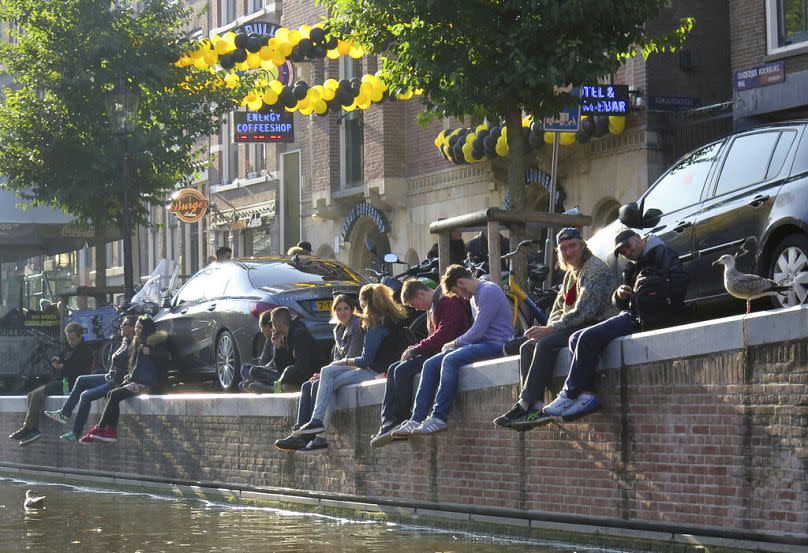European cities are becoming climate CHAMPs. You could be one, too

A new acronym in the climate space is getting its sea legs after the United Nations climate talks in Dubai last year, COP28. And if you, too, want to be a “champ” for climate action and policy, then this one’s for you.
It’s called CHAMP, and it stands for the Coalition for High Ambition Multilevel Partnerships, with the primary focus on all things multilevel.
It’s one of the easier acronyms to remember and reiterate in the climate vernacular. And it’s all about encouraging states to work with subnational governments to plan, finance, implement, and monitor climate strategies.
This was a long overdue and necessary prioritisation, of course, as climate action and policy require all hands on deck and all hands coordinating more closely together.
Too much has been missed, mis-mandated, or mismanaged in our efforts to decarbonise, and this new focus at the highest levels of international climate discourse is welcome.
The good news is that at the subnational level, our cities have already been doing this very CHAMP work on multiple levels, building coalitions across public and private sectors to make transformative climate policy change at scale.
Now, if we want to reach our ambitious climate targets and timelines, we need to figure out how to scale up this work further.
The examples below from our members Oslo, Stockholm, and Amsterdam illustrate well how the groundwork is being laid for this CHAMP initiative to take hold. Take a look.
Oslo’s business for climate network
As the City of Oslo notes, its ambitious climate targets — cutting greenhouse gas emissions by 95% by 2030 — is not something the municipality can do alone. They’re very clear in their messaging that they depend on having both Oslo-based businesses and the city population on board.
That’s why they established a Business for Climate Network to create “an arena for dialogue and cooperation between the municipality and the business community to achieve the climate goals and to mobilise business and other companies to actively contribute to achieving Oslo’s climate goals towards 2030.”

In signing this climate contract, businesses agree to “actively contribute to reaching Oslo’s climate targets and reduce emissions from their own operations, push climate solutions through innovation and procurement, demonstrate climate leadership, and cooperate, exchange experiences, share best practice and find solutions, and actively participate in the network”.
This is definitely CHAMP material, and about 170 businesses, ranging from small to large companies from various industries, are already involved. This provides an important network for collaborating on new climate actions.
So that’s the foundation; now to the opportunity. Oslo wants to expand and amplify this business network’s full reach and potential to help move the market, make the necessary industry shifts, influence industry regulation, accelerate the transition, and address concerns by industries not yet on board.
And that’s now where the rest of us come in, linking up this work with national and regional partners and policymakers to make this market shift happen. That’s the potential power associated with CHAMP.
Stockholm’s mass consolidation centre
The City of Stockholm recently created a mass consolidation centre that is emerging as a model for public-private partnerships in the built environment and circular economy space to ensure no stone is left unturned and unrecycled.
As the City of Stockholm notes, the “Mass Consolidation Center in Stockholm Royal Seaport is a unique venture in the Swedish construction industry” as “nothing similar has ever been done”.
At this centre, known as the Masslogistikcenter, local polluted soil and water are treated, and rocks from construction works are crushed before going back to the site to be used as building material. And the numbers are impressive.

The Masslogistikcenter is recycling roughly almost 80% of soil and 100% of stones and rocks from construction efforts, and 900,000 tonnes of rock and excavation materials have been repurposed so far.
Stockholm is saving substantially on “transport costs, landfill fees and on the purchase of new materials”, reducing traffic between the construction site and the landfill by 50%. Local recycling with the Mass Consolidation Centre also opens up and enables local emission-free transport at the site.
So that’s the foundation; now to the opportunity. As a first of its kind, this Masslogistikcenter serves as a model for other municipalities to replicate. It speaks volumes about the potential for scaling up similar public-private partnerships in the decarbonisation space and how this model can serve the circular economy within the built environment, specifically in the recycling and repurposing of building materials.
Amsterdam’s action networks 2.0
Amsterdam’s GasTerug (or GasBack) campaign to reduce gas use and dependency has been so successful in building a multilevel network — of companies, trade organisations, private initiatives, governments, institutions and utilities — to come together to realise energy savings that it’s launched a 2.0 version that’s model-worthy for other regions keen to replicate.
The GasTerug action network was created in response to the energy crisis resulting from Russia’s war in Ukraine.
Early in the war, Amsterdam’s former alderman Marieke van Doorninck called for action to get off Russian gas, which created a community-wide effort — called 15% GasTerug, or GasBack — to reduce gas use across the metropolitan area by 15% by the end of 2022 and then to keep it reduced long term.

The network of partners from the private and public sectors was an all-hands-on-deck approach. The GasTerug effort had one team devoted to offices, another team to neighbourhoods, and teams to companies and healthcare institutions, data monitoring, campaigning, and sharing knowledge.
They created a tangible and targeted road map for community action, with regular reporting on progress, and their success depended on everyone’s active participation.
This model was so successful that they decided to build a more permanent organisation, with a team devoted to this effort and a relaunched website supporting the GasTerug action network.
We can get tourism policies right — these three European cities show how it can be done
The EU nature restoration law is meant to help our cities become more liveable
And the team effort, across the whole of society, around a shared short-term goal that was responsive to the moment, captures many of the ingredients here that are also successful for CHAMP work.
What is the opportunity? People want to be a part of something bigger than themselves, and this network model creates a winnable goal.
The model focuses on what’s happening this year and has momentum. This is also clearly CHAMP material, and opportunities abound for similar GasTerug-like multilevel networking in the decarbonising cityscape.
All of the examples from Oslo, Stockholm, and Amsterdam represent new thinking and creative approaches to decarbonising a complex system in a partnered, multi-leveled way.
And that’s the future of climate action and policy.
It’s why COP28 championed it. Here’s to more of it, and soon, as we need all hands on deck and all of them working together. CHAMP for the win.
Dr Michael Shank is Director of Engagement at the Carbon Neutral Cities Alliance.
At Euronews, we believe all views matter. Contact us at view@euronews.com to send pitches or submissions and be part of the conversation.

